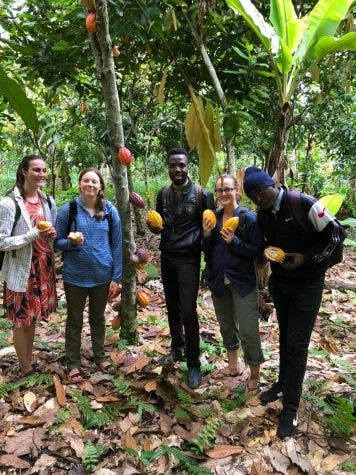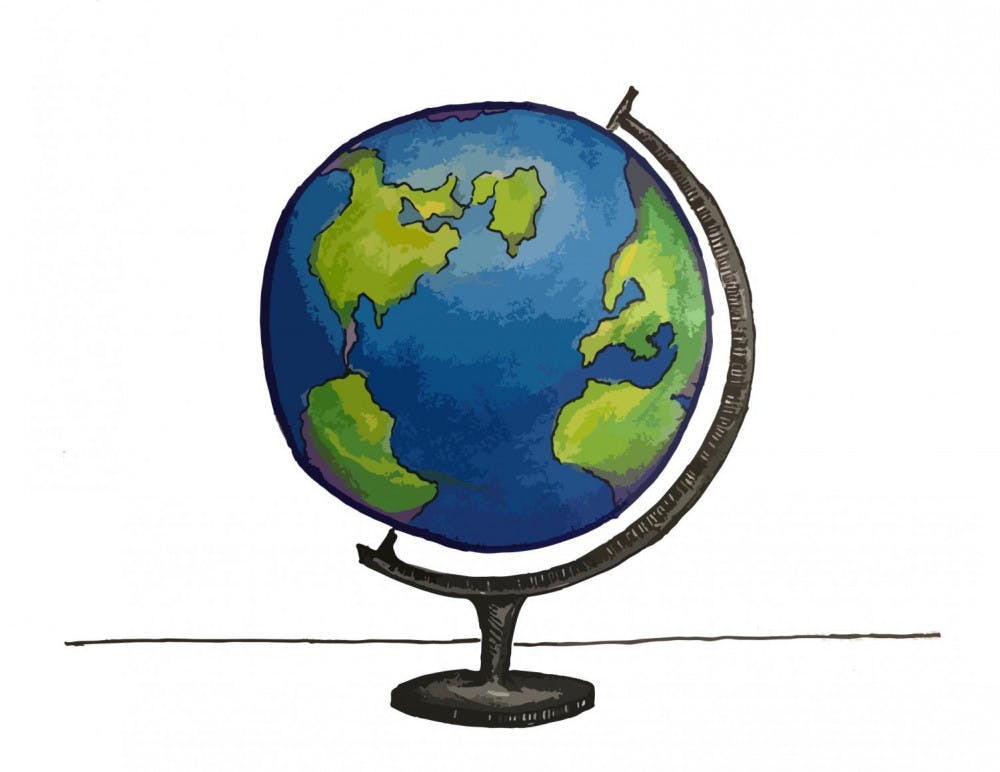As our taxi inched along, I watched all the students in their school uniforms, adults on their way to work and the countless Yaoundéens in the street, selling papayas, corrosols (my new favorite fruit), plantains, credit for telephone calls, fabric, tires and really anything you can imagine, and all I could feel was happiness. At 8 a.m., I arrived (surprisingly on time) and met up with my classmates for our étude de terrain or field trip, as if nothing had happened. We climbed into the bus with my professeur de géographie, and started off for the village of Okola, to walk around a cocoa plantation, talk to the Cameroonians working there, and of course, to suck on the sweet inside that envelopes the cocoa beans as we walked through the forest. The village was just a bit north of Yaoundé, the capital of Cameroon and the city of about three million people where I’ve been studying for more than two months now.
As we bumped around on the bus (you’d be hard pressed to find a street in Yaoundé without bumps and holes), it didn’t feel like I had just gotten off a plane at 4:30 a.m. from Casablanca, Morocco. It didn’t feel like I had just spent an entire week exploring Morocco, staying in Rabat and visiting the beautiful surrounding cities by train and bus. It didn’t feel like the country of Cameroon, situated between West and Central Africa, had just elected the same president, Paul Biya, for the seventh time, after having lived under his power for 36 years. Middlebury’s decision to send us to Morocco for a week felt like a dream. I understood the reasoning: the necessity to avoid possible election violence breaking out after the announcement of the results, which could have caused the airports to close and trap us inside the country.
When I first came to Cameroon, I never expected to be asked by my host parents: “Et toi? Tu as vécu pendant combien de conditions présidentielles aux États-Unis?” which is French for the question: how many American presidents have served during your lifetime? The answer for me is four. The answer for my host siblings, even my 25-year-old sister, is one. In the month leading up to the election, you could see the evidence of Paul Biya’s (and the state’s) power everywhere in the streets. The posters of his face were everywhere, on billboards, the walls of stores and houses. His face was on t-shirts, dresses, hats, backpacks, umbrellas and more, which people received for free at organized meetings. There were eight other candidates, but they were hardly visible.

Emily Ray '20 (far left) with members of her Middlebury study abroad group and locals at a cocoa plantation in the village of Okola.
The week before the election, we were told not to discuss politics in the shared taxis (the main form of public transportation) and on the streets. There was a rumor that people were positioned in Yaoundé, trying to find secessionists and stop their voices from spreading throughout the city. The secessionist movement in the country is part of the Anglophone crisis, a long-running conflict that intensified in Cameroon in 2016 between English-speaking separatists and a national government dominated by French speakers. The police presence grew in various locations. There was another rumor that a series of random arrests was going on throughout the city. When we went out, we had to carry copies of our passports with us. The phone connection went in and out, making communication harder. However, no violence or anything of significance occurred in Yaoundé leading up to Oct. 7, the jour de vote. Walking through the streets, I could feel in so many people the hunger and readiness for a change of power. On election day, the streets were eerily calm, especially for Yaoundé, a city of bustling disorder. It was said that it would take two weeks for the Supreme Court to officially announce the election results, on Oct. 22.
A week and three days after the election, the students of Middlebury’s School in Cameroon were abruptly told that we would be leaving for Morocco (a North African country that speaks Arabic and French) for a week, with the possibility that we wouldn’t be able to return. I was devastated. At the airport in Yaoundé, the program director told me, “Tu vas rentrer au Cameroun, Emily,” or, “You’re going to come back to Cameroon, Emily” and I took her words to heart. Luckily, she was right. We watched Paul Biya’s smiling face from Rabat, Morocco, as it was announced that he had won 71 percent of the vote (but who really knows how much of the vote he won given that the government also falsely claimed that Transparency International watched over the election process, according to a statement on the organization’s website). Following the results, there have been small incidences of violence in the Anglophone region, as well as a peaceful protest march in Douala, another major city, organized against fraud during the election.
It saddens me to imagine the future of Cameroon under the power of an 85-year-old president, who has failed to follow through on initiatives for his people in his 36 years of power. However, I know that this October’s election awakened the spirit of many Cameroonians. I’m sad for my adopted country and its questionable democracy, but I’m also a little bit hopeful. Now that I’m back, I just get to appreciate everything in Cameroon: my host family, my classmates, the markets, the rainy season and all the adventures, a little bit more.
Editor’s note: Cameroon held national elections on Oct.7. On Oct. 17, students participating in the college’s study abroad program in Yaoundé, Cameroon’s capital, were flown to Morocco on short notice amid concerns that the threat of violence following the announcement of election results would shutter airports and trap students in the country. All students returned safely to Yaoundé on Oct. 26. Yaoundé has not been stricken by election violence that other parts of Cameroon have seen, and the step to extract the students was precautionary. In this piece, Emily Ray ’20 reflects on this experience.
Foreign Correspondents: Yaoundé, Cameroon

COURTESY PHOTO
The view from Middlebury's center in Yaoundé, Cameroon.
The view from Middlebury's center in Yaoundé, Cameroon.
COURTESY PHOTO
Comments



